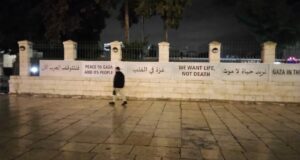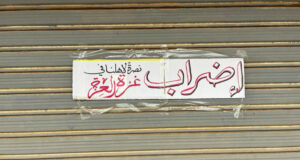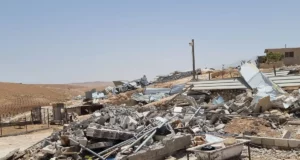
by the Palestine Solidarity Project
Abu Ayash and his family have owned and tended their land for around 100 years but are now facing increasing violence from the inhabitants of the nearby and ever expanding Israeli settlement Karme Zur. On Sunday, September 10, activists with the Palestine Solidarity Project (PSP) joined the farmer to defy the Israeli DCO (District Co-ordination Office – essential the Israeli army’s administrative wing in the West Bank), and make the harvest under the watchful eye of armed settler ‘security’ and Israeli army.
The family owns 3 dunums of land right next to Karme Zur, some of the grapevines reaching out onto the settler road separating the Palestinian land from the green lawns of the settlement. When the family tries to pick the grapes there, armed settlers harass and scare them away, threatening to shoot them if they return. The settlers demand that the family contact the DCO to gain permission to harvest, something that the family refuses to do since it is their land to visit as they please.

Since the family is largely unable to access this land, it is left unguarded for long periods of time. The settlers take advantage of this by picking the grapes for themselves or destroying the trees. In the past, they have used tractors to mow down trees, radically decreasing the harvest and the family’s income. For the past year and a half, the Abu Ayash family has been accompanied by international human rights workers when tending their land. This has substantially lessened the degree of harassment, even though settlers still try to interfere with their work, threatening family members and international activists alike.
On Sunday the 10th of September, volunteers from Palestine Solidarity Project (PSP) accompanied members of the Abu Ayash family to the 3 dunums bordering the settlement. Together, they picked about 1 ton, or 100 boxes, full of grapes which, in financial terms, means a significant income of 800-900 shekles for the family. Armed settler militia approached the harvesters with a jeering “Oh, there you are! We have been waiting for you!” and immediately took their positions along the road separating the land from the settler houses. Protesting whenever someone would climb onto the stone wall to reach for the bunches of grapes growing on the verge of the road, the settlers patrolled the area throughout the four hours the family were on the land. At one point, a military jeep pulled up and seemingly relieved the settler guards of their watch. As we were about to leave, a group of settler children approached to make fun of and spit at the activists.
In the debate concerning the Israeli occupation of Palestine, there is always a lot of talk about the security fears of colonist settlers and Israelis in general. It was, therefore, interesting to see how a young unarmed colonist mother with an infant strapped to her chest and a toddler hanging onto her left hand, calmly walked by the land where we were picking grapes, even stopping to get a closer look at us. This was before the armed settler militia had even arrived. Having seen this, and countless other examples of feigned security concerns, it is difficult to take seriously the proclaimed fear of attack from Palestinians – continuously used to justify the most barbarous policies and a continuation of the occupation.
Seventy dunums of farm land have already been completely confiscated by Karmi Zur colony, and the papers proving ownership have proven worthless in contesting the theft. In addition to the 70 dunums now within the settlement, the family owns an additional 5 dunums of land wedged in between the two settlements of Gush Etzion and Efrat. There are two ways of getting to this land – one a 10 minute drive on a settler-only road, and one a 60 minute journey by dirt-track over the hills. If Israeli police stop Palestinians traveling on the settler-only road they are charged a fine of 1,000 NIS. Both the fine and the time it takes to get to the land on the dirt-track are prohibitive factors that mean that the family is unable to tend their land as needed.

This year’s grape-harvest is now over. In a couple of months, the family will need to cut the vines and plow the earth. In the face of settler violence and military complicity, they will have to continue coordinating their plans with PSP in order to work on their own land. This is PSP’s second direct action in 10 days. PSP is a non-violent Palestinian-led movement based in Beit Ommar welcoming international participation and support. While the website is under construction, PSP can be reached at palestine_project@yahoo.com
 International Solidarity Movement Nonviolence. Justice. Freedom.
International Solidarity Movement Nonviolence. Justice. Freedom.


